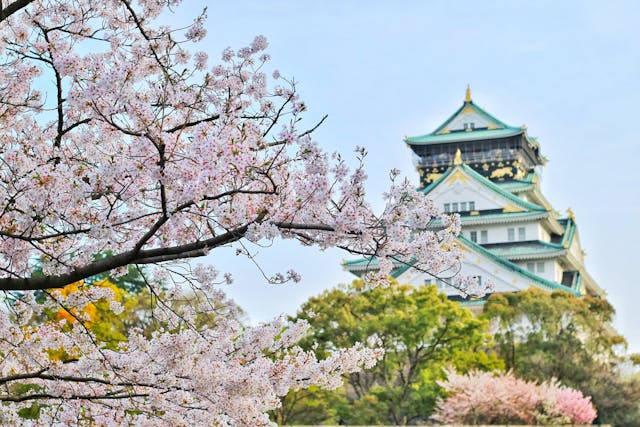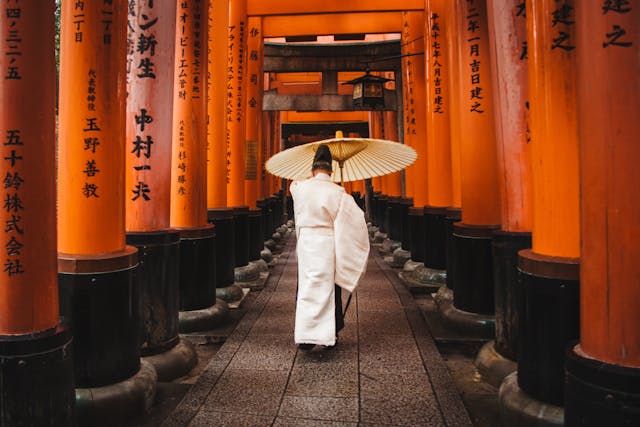Can You Get By in Japan with Only 10 Japanese Phrases?
Is it possible to get by in Japan with only 10 survival Japanese phrases? Walking through the bustling streets of Tokyo armed with just a handful of words might seem like a challenge. However, you will find that 10 phrases in Japanese are surprisingly sufficient to navigate the essential aspects of any holiday. This concise linguistic toolkit covers greetings, gratitude, requests for help, apologies, and basic transactions, encapsulating all basic communicative functions needed for a great holiday.
Far from being a limitation, this minimalist approach fosters a more rewarding and culturally authentic experience. Plus, it doesn’t leave room for excuses! While it may be impossible to learn a new language in just a few weeks, learning 10 life-saving expressions is totally doable!
So, without further ado, here are 10 basic phrases in Japanese that will make your trip to Japan easier, more meaningful, and more rewarding.
→Sign Up Now: Free Trial Japanese Lesson With a Native Teacher!←
1. Konnichiwa (こんにちは) – “Hello”
“Konnichiwa” is more than a way to say “Good morning” or “Good afternoon”; it’s a way of saying “Hey, I’m here”. And the best thing about it is you can use it for every occasion. The usefulness of a simple Konnichiwa stretches beyond just a greeting; use it to catch someone’s attention before asking for instructions, making a request, or even ordering some sushi at a restaurant. So, while you may not have enough time to learn how to write こんにちは, you definitely can (and should) learn how to say it: Konnichiwa!
2. Arigatou (ありがとう) – “Thank You”
If Arigatou is –next to Kinnichiwa– the Japanese phrase you’ve heard most often, that’s because gratitude is a universal language. This phrase is your go-to for expressing thanks, whether you’re receiving a drink in a bar, accepting directions from a local, or appreciating a gift. It’s a simple but powerful way to show appreciation, and it is also a very easy way to put a smile on people’s faces at the end of every interaction.
3. Sumimasen (すみません) – “Excuse Me / I’m Sorry”
There are a million occasions to use a phrase like “Sumimasen”. Of course, it is first and foremost a way to say “excuse me” when navigating through crowded spaces or after accidentally stepping on someone’s shoe. But, like all Japanese phrases in this blog, it is much more versatile than that. Saying “Sumimasen” is an effective way of saying “attention, please” when you need to ask for help or information. So make sure you know this one too!

4. Ikura desu ka? (いくらですか?) – “How Much Is This?”
Shopping for gifts, souvenirs, and even typical clothes is one of the most exciting parts of visiting a new place, which makes “Ikura desu ka?” one of the most useful Japanese phrases in our little list. You can use it to start a negotiation, to confirm a purchase, or just out of curiosity to learn what’s the price of an attractive item.
5. Toire wa doko desu ka? (トイレはどこですか?) – “Where is the Bathroom?”
When nature calls, it’s always best to answer. But what if you can’t find the bathroom? Well, this phrase will help you locate it in a second, all while wowing people with your Japanese knowledge! Out of all the phrases in Japanese we’ve compiled today, “Toire wa doko desu ka?” is the one that will ensure comfort during your travels, whether you’re in a restaurant, a shopping mall, or exploring the streets of Kyoto. A basic need covered by a basic question!
6. Eigo o hanasemasu ka? (英語を話せますか?) – “Do You Speak English?”
At Language Trainers, our task is to always encourage people to use the local language to communicate in a new country. However, that’s sometimes just not possible and we need an easy way out. “Eigo o hanasemasu ka?” (Do You Speak English?) will help you find people who can assist you in complex situations, whether you need to borrow a phone or locate a hospital.
7. Mou ichido itte kudasai (もう一度言ってください) – “Please Say It Again.”
If you have an intermediate or advanced level when it comes to spoken Japanese, you may not need to resort to phrase number 6. This one, however, will come in extremely handy.
Misunderstandings are part of the journey, and “Mou ichido itte kudasaiis” is your tool for clarification. Plus, it’s one of the best Japanese phrases to show your eagerness to understand and communicate effectively in the target language. We are sure locals will appreciate it and respect your efforts to communicate in Japanese!
8. Kore o kudasai (これをください。) – “Please Give Me This.”
It may not sound like the most polite thing to say, but believe us: this is one of the most useful phrases in Japanese. Whether you’re ordering food, buying tickets, or choosing souvenirs saying “Kore o kudasai” while pointing at your target helps you assert your choice without the need for extensive vocabulary. Just make sure you add a nice smile when you say it!
9. Menyuu o Eigo de misete kudasai – (メニューを英語で見せてください) – “Please Show Me the Menu in English.”
Eating out in Japan is an adventure in itself. Filled with unique flavours, colours and shapes, Japanese cuisine is one of the best in the world. However, not knowing exactly what you’re getting can be a bit anxiety-inducing for some people, especially those with specific allergies!
“Menyuu o Eigo de misete kudasai” is your bridge to understanding your dining options better, allowing you to explore Japanese flavours with confidence.
10. お願いします (Onegaishimasu) – “Please / I Request”
We started with Konnichiwa and Arigatou, and then moved on to more complex Japanese phrases. But before this blog is over, let’s circle back to a basic courtesy expression: Onegaishimasu. The great thing about this expression is that you can use it at the end of your requests even if you’ve spoken in English. This goes to show that even if you’re not fluent in Japanese, you can still look for ways to add a local flavour to your interactions.

More Common Phrases in Japanese
In this bonus section, we answer some of the most frequently asked questions from our Japanese learning community.
How do you say Goodbye in Japanese?
“さようなら (Sayounara)” is the most common way to say goodbye in Japanese, especially when you’re not expecting to see the person again for a while. In informal contexts, you can also use “じゃあね (Jaa ne)” or “またね (Mata ne)”. These phrases are more similar to “See you later” or “Bye,” and they’re better suited for situations in which you expect to meet the person again soon.
How do you introduce yourself in Japanese?
Start with “はじめまして (Hajimemashite),” which means “Nice to meet you.” Then say what your name is with a simple “と申します (to moushimasu)” (“My name is…”) After this, you can finish with “よろしくお願いします (Yoroshiku onegaishimasu),” a phrase that doesn’t have a direct English translation but is a way of requesting favorable treatment and good relations going forward.
What’s the most common flirting phrase in Japanese?
Flirting in Japanese is subtler than in most Western countries. However, a common phrase that is often used to express interest is “あなたはとてもきれいですね (Anata wa totemo kirei desu ne)”. It means “You are very beautiful,” and it’s most commonly used for complimenting a woman. If you’re looking for gender-neutral flirtatious Japanese phrases, go for “あなたともっと話したいです (Anata to motto hanashitai desu)”, which means “I want to talk with you more”. It’s a gentle way of expressing interest and letting someone know you want to spend more time with them.
How do you say “How are you”? in Japanese (Include response too)
To ask someone “How are you?” in Japanese, say “お元気ですか? (O-genki desu ka?). A common response to this question would be “はい、元気です (Hai, genki desu),” which means “I’m fine.” If you’re not doing well, you might say “いいえ、少し疲れました (Iie, sukoshi tsukaremashita),” meaning I’m a bit tired.” However, it’s worth noting that asking directly “How are you?” is not as common in Japan in casual conversation as it is in some other cultures. The question and its response are typically reserved for when there’s a genuine concern for the person’s health or well-being.
→Sign Up Now: Free Trial Japanese Lesson With a Native Teacher!←
So, is it possible to get by in Japan with only 10 phrases? Absolutely. With these useful phrases in Japanese, you’ll be able to do more than get by. You will show Japanese people that you’ve done your homework and done your best to communicate on their own terms, quite literally.
Are you planning to travel to Japan soon? At Language Trainers, we offer customised courses, both in-person and online, to help you brush up on your Japanese skills in Japanese. Whether you want to learn the basics of the Japanese alphabet or just want to practice the pronunciation and intonation of these basic survival Japanese phrases, we’re here to help. Contact us now and get a free trial online lesson in Japanese or let us arrange for you an in-person Japanese course in London or wherever you happen to live!
またね – Mata ne! See you later!
